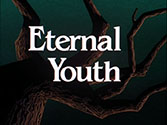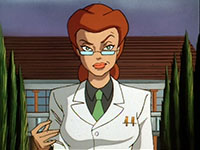|
||
|
| Credits | Cast | |
Written by Beth Bornstein Directed by Kevin Altieri Music by Lolita Ritmanis Animation by Sunrise |
Kevin Conroy as Bruce Wayne Efrem Zimbalist, Jr. as Alfred Bob Hastings as Commissioner Gordon Diane Pershing as Poison Ivy |
Julie Brown as Lily Paddy Edwards as Maggie Page Lynne Marie Stewart as Violet |
|
Perhaps it's just me, but I think it's her idealism that makes her such an unsatisfying adversary. Environmental policy is an important subject; the science is not well understood; and its real-world applications are vexedly difficult to figure out. Something so serious is cheapened when treated melodramatically, whether by flesh-and-blood activists or by the tiresome fairy tales of Fern Gully: The Last Rainforest. Ra's al-Ghul's obsession with making the world pristine is at least colored by his undisguised egomania, which gives him a compelling luster. But Poison Ivy just comes across as a tree-hugging philistine, which subtracts from the credibility of both her character and her cause. And when Bruce Wayne is forced to trot out his environmental bona fides by condemning a "slash-and-burn outfit," it is apt to leave those who care about the environment feeling condescended to. The wisdom of this or that environmental policy is not a function of this or that environmentalist's intentions or good will. Subtract the crude philosophizing and what's left? A floozy with a fetish. Not that there is anything wrong with that. In fact, by dumping the public policy angle, "House and Garden" and "Chemistry" gave us some good, gum-cracking adventures wrapped around a genuinely emotional story. At her best, Ivy is like Mother Earth suffering from PMS. "Eternal Youth," however, is something else—a weird mix of comic-book melodrama and sidekick development. Ivy's plot to turn industrialists into topiary is one of those high-concept pitches that is good for about five seconds of grin-inducing shock but devoid of any possibility of development. So instead we get the queer introduction of Alfred and newcomer Maggie as a quasi-romantic pair who can be victimized and then rescued by the hero. There is no natural connection between the Alfred and Ivy ends of the plot except for this manipulative angle, so the result is just a mishmash of cliches rather than a coherent story. As for Maggie and Alfred themselves: if you didn't suspect it already, this episode proves that Alfred's interest as a character is mostly a function of his relationship with Bruce. In other words, Maggie comes off as the proverbial third who makes a crowd. |
|
|
|
Related Episodes |
What Others Are Saying ... |
| Back to Dreams in Darkness |
Forward to Fear of Victory |


